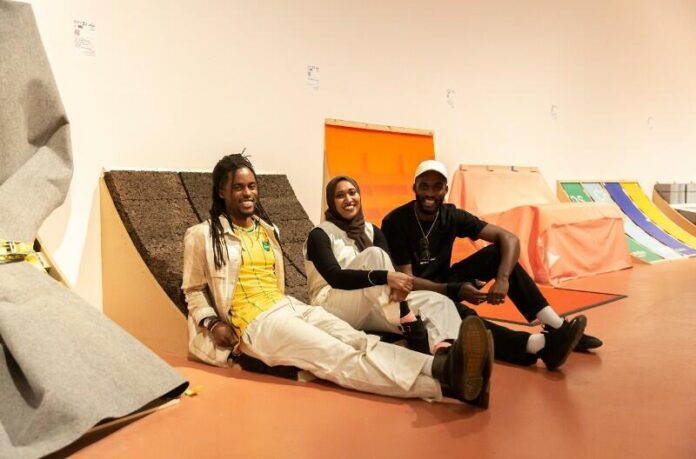A display at The Curve Gallery in London’s Barbican Centre will be taken down in the wake of a censorship row after Barbican staff asked a speaker to avoid the topic of “free Palestine” at a recent talk. The display by the London-based interdisciplinary design studio Resolve Collective group was due to run until 16 July.
In an Instagram post (21 June), the collective said it was cancelling the display because of “an act of anti-Palestinian censorship”. The show was initially scheduled to close on 16 July; an online statement says that the gallery is now closed.
“The exhibition will reopen on Monday [26 June] but everything will be taken down and we’ll gradually start distributing the material and emptying the space,” a spokesperson for Resolve Collective tells The Art Newspaper.
In the Instagram statement, the collective said the decision partly stemmed from the cancellation of a talk on 15 June between the Egyptian researcher Nihal El Assar and Elias Anastas, the co-founder of the Palestinian radio station, Radio Alhara. The livestreamed discussion on the “radical possibilities of radio” was part of Resolve Collective’s them’s the breaks series of programmed events.
“On arriving we learned that the talk had been cancelled,” the collective says, adding that they were informed by the organiser of the event, Abiba Coulibaly, of “an act of anti-Palestinian censorship” by a Barbican staff member.
On the Barbican website, a statement says: “In haste, shortly before the event was due to begin, the Barbican shared an editorial note with the speaker asking him to avoid spending too much time discussing free Palestine. The situation was compounded by a technical failure with the live broadcast, which unfortunately brought the event to an abrupt close.”
In a message, shared by both Radio Alhara and Resolve Collective on Instagram, the speakers are told to avoid speaking about the topic at length in order to “safeguard the audience”. The collective now say the talk has been rescheduled, adding that they will be joining the Radio Alhara team to “address what happened”.
Meanwhile, Resolve Collective says it also sent an email to the Barbican summarising their “disappointment at a number of hostile encounters” they allegedly experienced from “a select few members of the Barbican front of house staff including “hostility towards close family and friends at the exhibition opening”. It adds: “Over the course of our time as Curve Gallery artists, we experienced a number of shameful incidents.”
Claire Spencer, the chief executive of the Barbican, and Will Gompertz, artistic director, say in a statement: “During the run of their exhibition, Resolve Collective and their collaborators have been subject to a number of unacceptable experiences, which included the events that took place 15 June. We are deeply sorry for the pain caused to the members of Resolve Collective and those involved in their exhibition. Nobody should have to work in a place where they don’t feel welcome and respected. Will and I are taking this situation extremely seriously and are currently working with the broader Barbican team to understand the details of what happened.”
In its Instagram statement, Resolve collective said it plans “to exit the Barbican Curve Gallery prematurely which will unfold in three parts”. Firstly, the artists will cancel all public programme events at the Barbican. Then the material within the exhibition will be taken down “leaving the gallery bare from 26 June”. Finally, the collective will gradually distribute the materials from the exhibition to “organisations, practices and individuals interested and in need” through a series of “closing down sales”.
Barbican management adds that it is “fully supportive of Resolve Collective’s decision to change the nature of their exhibition and will work with them to make this possible. The exhibition will reopen on 26 June until 16 July.”
In 2021, The Barbican Centre carried out an extensive staff reorganisation following the publication of a book compiled by an organisation known as the Barbican Stories Collective, which included more than 100 instances of alleged prejudicial behaviour at the City of London cultural venue.
Spencer and Gompertz add: “A great deal of work has already gone into building a new culture at the Barbican in which all our people, and those who we work with, are valued, supported, and feel they belong. It’s clear we have a lot more work to do but we are committed to making the Barbican a place that is inclusive, welcoming, and safe for everyone.”
According to the Barbican website: “As part of the [Curve Gallery] display, [Resolve Collective] use technology usually found in structural engineering to visualise what’s happening inside the Barbican’s concrete structure: using the cracks that naturally occur in a building as prompts for how we consider the structural decline of our systems, institutions, and buildings.”

























